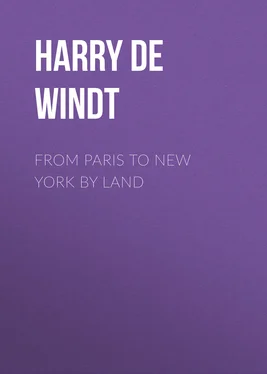Harry De Windt - From Paris to New York by Land
Здесь есть возможность читать онлайн «Harry De Windt - From Paris to New York by Land» — ознакомительный отрывок электронной книги совершенно бесплатно, а после прочтения отрывка купить полную версию. В некоторых случаях можно слушать аудио, скачать через торрент в формате fb2 и присутствует краткое содержание. Жанр: foreign_prose, foreign_antique, на английском языке. Описание произведения, (предисловие) а так же отзывы посетителей доступны на портале библиотеки ЛибКат.
- Название:From Paris to New York by Land
- Автор:
- Жанр:
- Год:неизвестен
- ISBN:нет данных
- Рейтинг книги:4 / 5. Голосов: 1
-
Избранное:Добавить в избранное
- Отзывы:
-
Ваша оценка:
- 80
- 1
- 2
- 3
- 4
- 5
From Paris to New York by Land: краткое содержание, описание и аннотация
Предлагаем к чтению аннотацию, описание, краткое содержание или предисловие (зависит от того, что написал сам автор книги «From Paris to New York by Land»). Если вы не нашли необходимую информацию о книге — напишите в комментариях, мы постараемся отыскать её.
From Paris to New York by Land — читать онлайн ознакомительный отрывок
Ниже представлен текст книги, разбитый по страницам. Система сохранения места последней прочитанной страницы, позволяет с удобством читать онлайн бесплатно книгу «From Paris to New York by Land», без необходимости каждый раз заново искать на чём Вы остановились. Поставьте закладку, и сможете в любой момент перейти на страницу, на которой закончили чтение.
Интервал:
Закладка:
We reached Ust-kutsk (the first town of any importance) on the sixth day. This place figures largely on most English maps, but it is little more than an overgrown village. A church with apple-green dome and gilt crosses, a score of neat houses clustered around the dwelling of an ispravnik , 9 9 An official who combines the duties of Mayor and Chief of Police.
perhaps a couple of stores for the sale of clothing and provisions, and a cleaner post-house than usual: such is a "town" on the banks of the Lena. With the exception of Ust-kutsk there are only three, Kirensk, Vitimsk, and Olekminsk, places of such little general interest that they are chiefly associated in my mind with the four square meals we were able to obtain during those three weeks of incessant travel. At Ust-kutsk, for instance, we refreshed the inner man with a steaming bowl of schtchi or cabbage soup followed by the tough and greasy chunks of meat that had been boiled in it, and the meal tasted delicious after nearly a week on black bread, an occasional salt fish and dubious eggs. Our own provisions were so hopelessly frozen that we seldom wasted the time necessary to thaw them out into an eatable condition.There are salt-mines near Ust-kutsk from which about 50,000 poods 10 10 A "pood" is thirty-six English pounds.
are annually exported throughout the Lena province, and the forests around here contain valuable timber, but agriculture did not seem so prosperous here as in the districts to the north and south. Oddly enough the cultivation of the land seemed to improve as we progressed northward, as far as Yakutsk, where, as the reader will presently see, the most modern methods of farming have been successfully adopted by a very peculiar and interesting class of people.
I was told that during the navigation season, from June until the latter end of September, Ust-kutsk is a busy place on account of the weekly arrival and departure of the river steamers. But lying silent and still in the icy grip of winter, this appeared to me to be the most desolate spot I had ever set eyes upon. And we left it without regret, notwithstanding that a darkening sky and threatening snow-flakes accompanied our departure, and the cold and hunger of the past few days had considerably lowered the high spirits in which we had left Irkutsk. Up till now monotony had been the worst evil to bear. In summer time the river as far as Yakutsk is highly cultivated, and smiling villages and fertile fields can be discerned from the deck of a steamer, but in winter, from a sleigh, nothing is visible day after day, week after week, but an unvarying procession of lime-stone, pine-clad cliffs, which completely shut out any scenery which may lie beyond them, and between which the bleak and frozen flood lies as inert and motionless as a corpse. Even at Ust-kutsk, nearly 3000 miles from the Arctic Ocean, the stream is as broad as an arm of the sea, which enhances the general impression of gloom and desolation. But in this world everything is comparative, and we little dreamt, when reviling the Lena, that a time was coming when we should look back even upon this apparently earthly Erebus as a whirlpool of gaiety.
When we left Ust-kutsk at about 3 P.M. night was falling fast, a proceeding which scattered snow-flakes followed with such vigour that only a few versts had been covered when we were brought to a standstill by a dense snowstorm, which, with a northerly gale, rapidly assumed the proportions of a blizzard. Providence has mercifully ordained that a high wind seldom, if ever, accompanies a very low temperature or on this occasion (and many others) we should have fared badly. But here and in the Arctic a fall of the glass was invariably accompanied by a rise of the thermometer, and vice versâ . During this, our first storm, it was only eight degrees below zero, and even then it was impossible to face the wind for more than a few moments at a time, for it penetrated our heavy fur coats as though they had been of crêpe-de-chine , and cut into the face like the lash of a cat-o'-nine-tails. I had never experienced such a gale (although it was nothing to those we afterwards encountered), for the wind seemed to blow from all points of the compass at once as we blundered blindly along through the deep snow, pushing and hauling at the sleighs as well as our numbed hands and cumbersome garments would permit. So blinding was the snow we couldn't see a yard ahead; so fierce the wind we could scarcely stand up to it. Suddenly both teams gave a wild plunge which sent us sprawling on our faces, and when I regained my feet the sleighs were upset and the horses, snorting with terror, were up to their girths in a snow-drift. I then gave up all hopes of reaching a station that night. For over an hour we worked like galley-slaves, and suddenly when we had finally got things partly righted, the wind dropped as if by magic, and one or two stars peeped out overhead. The rapidity with which the weather can change in these regions is simply marvellous. We often left a post-house in clear weather, and, less than an hour after, were fighting our way in the teeth of a gale and heavy snow. An hour later and stillness would again reign, and the sun be shining as before! We now quickly took advantage of the lull to push on, and in a few hours were rewarded by the glimmering lights of a post-house. We had reached the village of Yakurimsk and, being fairly exhausted by the cold and hard work, I resolved to stay here the night. This was our first experience of frost-bite (both faces and hands suffered severely), which is not actually painful until circulation returns, and care must then be taken not to approach a fire. I have always found that snow, vigorously rubbed on the frozen part, is the best remedy. The stage between Ust-kutsk and Yakurimsk was a short one, only about eighteen versts , but it took us six hours to make it. When we awoke next morning bright sunshine was streaming into the guest-room, which was older and filthier than usual. But it possessed a cracked and cloudy looking-glass which dimly reflected three countenances swollen and discoloured beyond recognition. For we had neglected to anoint our faces with grease (Lanoline is the best), but after this experience never neglected this essential precaution.
The postmaster at Yakurimsk, a decrepit Pole of benign but unwashed exterior, informed me that the woods around his village swarmed with bears, and that on payment of a few roubles for beaters he could ensure us a good day's sport. But although the offer was tempting I did not feel justified in risking the delay. Wolves had also been numerous, but had, as usual, confined their attacks to pigs and cattle. Before visiting Siberia I had the usual fallacious notion concerning the aggressiveness of this meek and much maligned animal. I remember, in my early youth, a coloured plate depicting a snow scene and a sleigh being hotly pursued at full gallop by a pack of hungry and savage-looking wolves. In the sleigh was a Cossack pale with terror, with a baby in his teeth and a pistol in each hand. I fancy that, in riper years, I must have unconsciously based my estimate of the wolf's ferocity on this illustration, for I have now crossed Siberia four times without being attacked, or even meeting any one who had been molested. The only wolf which ever crossed my path was a haggard mangy-looking specimen, which, at first sight, I took for a half-starved dog. We met in a lonely wood near Krasnoyarsk in Western Siberia, but, as soon as he caught sight of me, the brute turned and ran for his life!
Our drivers and horses were exchanged at every station so that the severe work of the previous night did not retard our progress after leaving Yakurimsk. The weather was fine and we made good headway until the 28th, on the afternoon of which day we reached the second town of Kirensk. A few miles above the latter the Lena makes a wide détour of fifty to sixty miles and the post-road is laid overland in a straight line to avoid it. It was a relief to exchange, if only for a few hours, that eternal vista of lime-stone and pines for a more extended view. The Kirensk mountains are here crossed, a range which, although of no great altitude, is precipitous and thickly wooded, so much so that in places the sleighs could scarcely pass between the trees. The climb was severe, but a lovely view over hundreds of miles of country amply rewarded our exertions. The glorious panorama of mountain, stream, and woodland stretching away on all sides to the horizon, intersected by the silvery Lena, was after the flat and dismal river scenery like a draught of clear spring water to one parched with thirst. Overhead a network of rime-coated branches sparkled against the blue with a bright and almost unnatural effect that reminded one of a Christmas card. A steep and difficult descent brought us to the plains again, and after a pleasant drive through forests of pine and cedar interspersed with mountain ash and a pretty red-berried shrub of which I ignore the name, we arrived, almost sorry that the short land trip was over, at Kirensk.
Читать дальшеИнтервал:
Закладка:
Похожие книги на «From Paris to New York by Land»
Представляем Вашему вниманию похожие книги на «From Paris to New York by Land» списком для выбора. Мы отобрали схожую по названию и смыслу литературу в надежде предоставить читателям больше вариантов отыскать новые, интересные, ещё непрочитанные произведения.
Обсуждение, отзывы о книге «From Paris to New York by Land» и просто собственные мнения читателей. Оставьте ваши комментарии, напишите, что Вы думаете о произведении, его смысле или главных героях. Укажите что конкретно понравилось, а что нет, и почему Вы так считаете.












